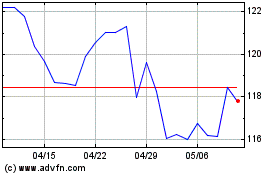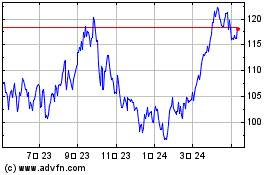Coalition United for a Responsible Exxon (CURE) Publishes Paper Addressing Long-Term Deterioration in ExxonMobil’s Performa...
2021年5月7日 - 5:26AM

The Coalition United for a Responsible Exxon (“CURE” or the
“Coalition”) today published a paper that analyzes ExxonMobil
Corporation’s (NYSE: XOM) (“Exxon”)
critical governance
failures and poor performance. The paper provides a number
of concrete
recommendations to strengthen Exxon’s
governance and develop a new strategic direction in line with the
Paris Agreement on Climate Change. As of today, CURE represents
over 135 stakeholder organizations, who collectively represent $2.5
trillion in assets focused on sustainability and committed to
delivering long-term returns that account for the realities of a
changing energy sector.
Josh Zinner, Executive Director of Interfaith Center for
Corporate Responsibility and a member of CURE, commented, “Once the
largest public company in the world, Exxon’s current market
capitalization is half the size of its peak in 2007. As investors
committed to energy transition, we can no longer stand by idly
watching Exxon continue on its current path of seemingly reckless
value destruction. CURE’s 135 members recognize that change is
desperately needed at Exxon and applaud our fellow shareholders who
are campaigning for meaningful progress. We believe that bold
changes in governance and strategy are necessary to steer the
company into the sustainable, decarbonized economy we need for the
future.”
CURE’s paper lays out two main factors – each attributable to
poor oversight – that it believes have contributed to Exxon’s
deteriorating financial performance and shareholder returns over
the past decade:
- The Exxon Board’s sanctioning of
high cost, low return investments, and acquisitions that
significantly diluted its return on capital; and
- The Exxon Board’s failure to
appreciate the cyclicality of oil and gas prices, preferring to
invest on the assumption that the high oil prices of 2010-2014 were
the new normal.
CURE is concerned that Exxon’s Board has little experience of
cyclical industries and does not have sufficient confidence or
expertise to challenge a powerful CEO/Chairman over questionable
investments that have diluted the Company’s return on capital
relative to its peers. In addition to having limited experience in
the Company’s core business areas – energy and oil & gas – CURE
believes that Exxon’s independent directors also seemingly have
limited experience for dealing with the changes necessary for
navigating the energy transition and a decarbonizing global energy
economy disrupting the Company’s core business.
CURE has published the following recommendations in an effort to
enable Exxon to serve all of its stakeholders responsibly and
enhance shareholder value in the emerging clean energy economy:
Strengthen governance to avoid repeating past
mistakes
- Split the joint CEO/Chair position
- Broaden Board and management expertise by appointing multiple
new directors and senior executives with energy and climate
experience
- Align CEO and executive compensation more directly with total
shareholder return and GHG reduction performance metrics
Establish and disclose a plan in line with the Paris
Agreement to prepare for the Energy Transition
- Set an absolute enterprise-wide net-zero target by 2050,
including interim short- and medium-term targets, and a detailed
decarbonization strategy for achieving targets
- Develop a climate lobbying position aligned with the Paris
Agreement
- Provide scenario analysis disclosure, including carbon price
assumptions and asset-level detail
- Provide regular updates on the Company’s compliance with
climate targets
Several proposals to be voted on at the Company’s upcoming
annual meeting address certain of the Coalition’s concerns, and the
members of CURE therefore intend to vote in favor of the following
proposals:
Item 4: Independent Chairman Item 6:
Report on Scenario AnalysisItem 10: Report on
Climate Lobbying
The Coalition concluded, “The global energy transition has
unleashed forces that have eroded business models based on oil and
gas. These changes are fundamental, irreversible, and will only
accelerate as climate policy is more rigorously implemented around
the world. While its better-performing rivals pivot into clean
energy technologies and new disruptive players enter the energy
market, Exxon has seemingly doubled down on oil and gas. Energy
companies that have leaned into the transition have grown rapidly,
while oil and gas supermajors have stumbled and shrunk. With
qualified leadership overseeing a strategy that acknowledges this
reality, Exxon has the opportunity to leverage its scale and the
talent of its people to reverse its current declines. In our view,
by better aligning with a growing global consensus that we must
achieve net zero emissions by 2050, Exxon can avoid further
stranded assets and value destruction.”
The full paper and additional information regarding the
Coalition United for a Responsible Exxon (CURE) can be found at
https://curexxon.org/.
AboutThe Coalition for a Responsible
Exxon (“CURE”) represents a global spectrum of
stakeholders focused on sustainability and committed to delivering
long-term returns that account for the realities of a changing
climate and energy sector. As of May 3, 2021, CURE brings together
over 135 institutional members, who collectively represent $2.5
trillion in assets.
Media ContactDan Gagnier / Jeffrey
MathewsGagnier
Communications+1-646-569-5897CURExxon@gagnierfc.com
Exxon Mobil (NYSE:XOM)
過去 株価チャート
から 3 2024 まで 4 2024

Exxon Mobil (NYSE:XOM)
過去 株価チャート
から 4 2023 まで 4 2024
